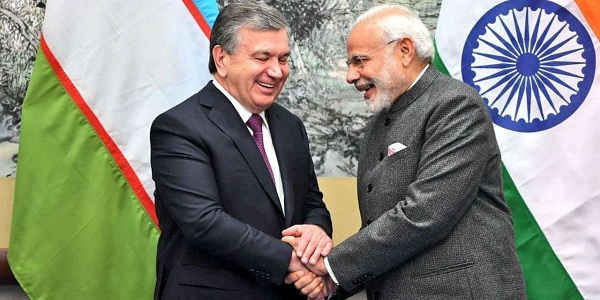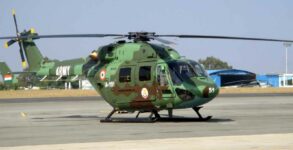When Russian President Vladimir Putin is arriving in India for a two-day visit on October 4, it will be appropriate to see through diplomatic prism the just concluded back to back visit of Afghan President Ashraf Ghani and Uzbek President Shavkat Mirziyoyev in the country. While security and strategy were the obvious motive behind India’s readiness to throw red carpet welcome to these foreign dignitaries, connectivity and energy were other major reasons that pushed New Delhi to bond with these leaders.
Both Afghanistan and Uzbekistan are close neighbours. Increase in ISIS footprint and rise of Wahhabism in the region have become a major concern for these countries as well as that of India, Russia, China and other international community members.
Islamic State terrorists’ continued killing spree in Afghanistan since mid-June and latest suicide bombing and hostage-taking incident in Jalalabad have generated a sense of fear among countries which want early return of peace and stability in the landlocked nation. On September 19, Afghanistan deported an Indian national from Kerala who had entered the war-torn nation illegally with intention to join in 21 friends who were part of Afghanistan-based ISIS since 2016. Concerned by such developments, India is ready to help Afghanistan in its fight against ISIS. But it is dead against holding any talks with the Taliban without the group accepting to surrender arms, showing faith in the country’s constitution and democracy as preconditions.
Russia, China and Iran are in favour of the peace talks with the Taliban, the terrorist group which wants slice of power without following any democratic process. The Afghan President was invited to brief Indian leaders on the security situation in the country and arrival of Imran Khan-led government in Pakistan and his proximity with the Taliban. India fears that any effort to make the Taliban part of power-share arrangement in Kabul will lead to bringing the pre-2001 situation back in Afghanistan. Indian leaders are said to have conveyed their apprehension about the Taliban to Uzbek President Mirziyoyev also during his maiden visit to India on September 30. The Uzbek government had hosted a delegation from the Afghan Taliban in August. “Head of the Taliban’s political office in Qatar Sher Muhammad Abbas Stanekzai had met Uzbek Foreign Minister Abdul Aziz Kamilov over a four-day period from August 6 discussed the prospect of the peace process in Afghanistan,” the Uzbek Foreign Ministry said in a statement.
Bypassing US’ objections, India readies to throw red carpet welcome to Putin on his visit
Interestingly, India has a strong defence partnership with almost all Central Asian countries, including Uzbekistan. The Central Asian country, which has agreed to hold joint military exercise in the area of counter-terrorism, cooperate in the area of military education and medicine, has offered India a proposal to set up a defence manufacturing unit which would lead to give New Delhi strategic inroads in the resource-rich country. Already, New Delhi is learnt to be in talks with Tajik government over the lease of Ayni airbase, a former Soviet airbase that was refurbished by India in 2007.
On account of pressure from Russia, sources said, India has not been able to further upgrade the airbase for operationalization purpose. China and Pakistan, which are few hundred kilometers away from Tajikistan, are two other countries which are creating hindrances in the way of India’s attempt to operationalize the airbase. Still, for India which has already a military hospital and military training officials in Farhor Airbase which is another airbase of Tajikistan, Ayni Airbase will be a prize catch. So far not disclosed because of sensitivity involved in it, India is not ready to put in cold storage its ambition to have first overseas military base in the Central Asian region.
J&K: Why and how Satyapal Malik became Governor of the crucial State
At the Sochi informal summit in May, it is learnt that Prime Minister Modi had discussed the issue with Russian President Putin. Sources privy to the development on Ayni Airbase say a large number of Russian authorities sitting in Kremlin have softened their rigidity against India’s desire for the strategic airbase in Tajikistan. A further push to the issue would be given during Putin’s two-day visit to India. This indicates India’s keenness to give weight to its strategic heft in the Central Asian region for which Afghanistan serves as a window.
To this regard, operationalisation of the ambitious International North-South Transport Corridor, a ship, land and rail connectivity project, will serve as a major opportunity in linking India with Central Asia and Europe. Considered to be an answer to China’s Belt and Road Initiative, the 7200-km long INSTC project has total 13 countries as its members, while Bulgaria is an observer. Uzbekistan has also shown its keenness to join the corridor project. Iran, which is one of founder members of the INSTC, is expected to hold a ministerial meet of the connectivity project anytime in October. It is said that much of the technical roadblocks coming in the way of smooth operationalization of the INSTC will be cleared after the ministerial meet. Iran’s Chabahar port where India is developing berth and other key cargo facilities, will serve as key link point for India with Afghanistan, Central Asia, Russia and Europe.
But strategy and connectivity are not only reason for India to enhance its footprint in Central Asia. Its quest for nuclear energy for its strategic uranium reserve is another key motivation for enhanced engagement with the resource-rich Central Asian countries. India has already a deal with Kazakhstan for the supply of nuclear fuel. During Mirziyoyev’s visit, India took opportunity to invite Uzbekistan, the world’s seventh biggest exporter of nuclear fuel, to join the list of countries keen to supply uranium to New Delhi. After formal arrangement is in place, Uzbekistan will start supplying more than 2000 tonnes of uranium to India. Therefore, the just concluded visits of Afghan and Uzbek Presidents were not planned in a huff, it was organized to inject energy and life to its engagement in Afghanistan and Central Asia.
Disclaimer: The opinions expressed in this article are the personal opinions of the author.


















